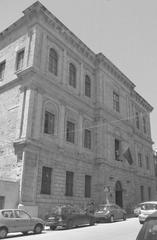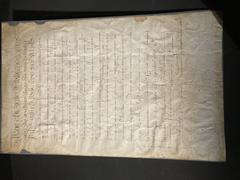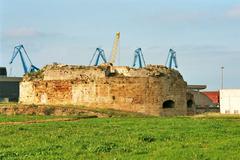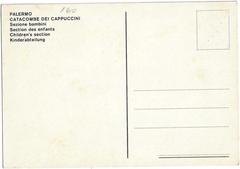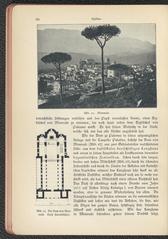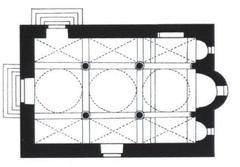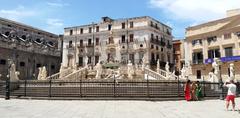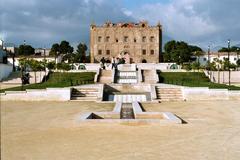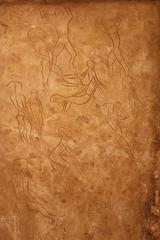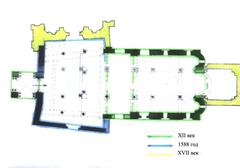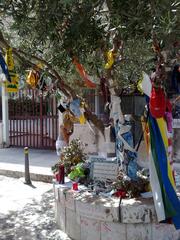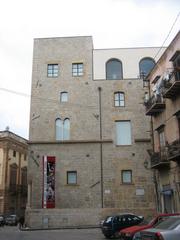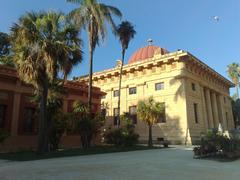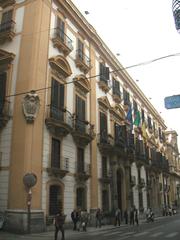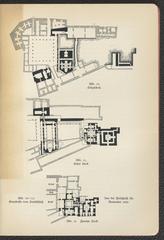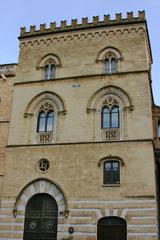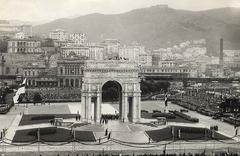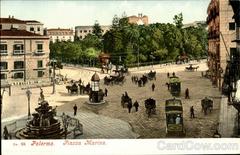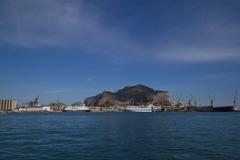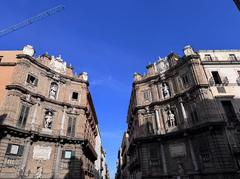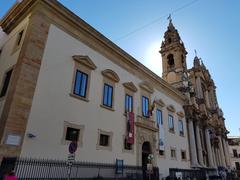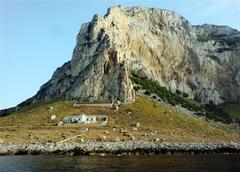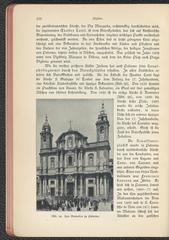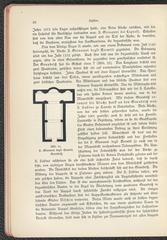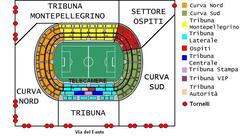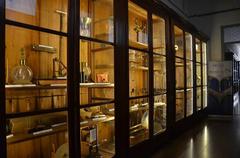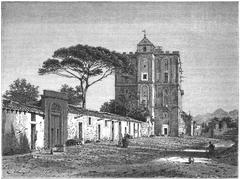
Archivio di Stato di Palermo: Visiting Hours, Tickets, and Historical Significance
Date: 04/07/2025
Introduction: The Cultural Importance of the Archivio di Stato di Palermo
Located in the historic heart of Palermo, Sicily, the Archivio di Stato di Palermo is a premier institution dedicated to preserving the island’s multifaceted history. Founded in 1814, the archive serves as the central repository for an extensive collection of administrative, legal, ecclesiastical, and diplomatic documents, chronicling Sicily’s evolution from medieval times through the modern era. Housed in the former Convent of Santa Maria della Gancia, the archive not only safeguards invaluable historical records but also offers visitors an immersive experience within Renaissance and Baroque architectural settings.
The Archivio di Stato di Palermo is an essential destination for historians, genealogists, researchers, and travelers interested in exploring Sicily’s rich heritage. Its collections reflect the diverse influences of Norman, Aragonese, Spanish, Bourbon, and Italian rule. With a commitment to accessibility and education, the archive supports public engagement through restoration laboratories, a specialized School of Archival Science, and ongoing digitization initiatives in partnership with platforms such as FamilySearch and the Antenati Portal. Its central location, near landmarks like Palermo Cathedral and the Norman Palace, allows visitors to combine archival research with broader cultural exploration. For current details on visiting hours, tickets, and events, refer to the official Archivio di Stato di Palermo website, and explore comprehensive resources such as the Guida Agli Archivi di Stato, FamilySearch, and the Antenati Portal.
Key Contents
- Overview of the Archivio di Stato di Palermo
- Visiting Hours and Ticket Information
- Accessibility and Visitor Facilities
- Guided Tours and Events
- Tips for Travelers and Nearby Attractions
- Architectural and Institutional Highlights
- Historical Evolution and Collections
- Preservation and Education Initiatives
- Research Opportunities and Digital Resources
- Practical Visitor Information and FAQs
- Conclusion and Visitor Guidance
Discover the Archivio di Stato di Palermo: A Must-See Historical Site
The Archivio di Stato di Palermo is not just an archive but a gateway to understanding Sicily’s layered history. Its extensive collections and striking architectural setting create a unique experience for anyone eager to explore Palermo’s past. Whether you are tracing family roots, delving into historical research, or simply curious about Sicilian culture, the archive offers both accessible resources and a memorable atmosphere.
Visiting Hours and Ticket Information
As of 2025, the archive is generally open Monday to Friday, 8:30 AM to 2:00 PM (with some reading rooms offering extended hours). Saturdays, the archive operates 8:00 AM to 1:30 PM, while it remains closed on Sundays and public holidays. Admission is free for research and general visits, with registration required at the entrance. Guided tours and special events may require advance booking and, occasionally, a modest fee. Always consult the official website for the latest information.
Accessibility and Visitor Facilities
The Archivio di Stato di Palermo is committed to accessibility. Entrances and restrooms in its primary sites (Catena and Gancia convents) are wheelchair accessible. Visitors with mobility needs are encouraged to inform staff in advance for tailored assistance. Facilities include reading rooms, lockers for personal belongings, and rest areas.
Guided Tours and Special Events
Guided tours, led by expert archivists, provide an in-depth look at the archive’s history, architecture, and collections. These are available by appointment, especially for groups and educational institutions. The archive also organizes temporary exhibitions, workshops in archival science and paleography, and cultural events throughout the year. Schedules and booking instructions are available on the official website.
Travel Tips and Nearby Attractions
Strategically located in Palermo’s historic Kalsa district, the archive is close to several notable attractions:
- Palermo Cathedral (Norman architectural masterpiece)
- Norman Palace (Palazzo dei Normanni)
- Ballarò and Vucciria Markets (vibrant street markets)
- Piazza Marina and Palazzo Abatellis (art and history treasures)
Plan to combine an archive visit with nearby sightseeing and enjoy local Sicilian cuisine at trattorias. Note that photography is permitted in designated areas only—flash and tripods are generally prohibited to protect sensitive documents.
Architectural and Institutional Highlights
The archive is housed in two significant former convents:
- Ex Convento della Gancia (Santa Maria degli Angeli): Features late medieval and Renaissance architecture, with an arcaded cloister and original frescoes.
- Catena Convent: Built in 1601, reflecting Palermo’s religious and cultural legacy.
Both buildings have been adapted with climate-controlled storage and modern restoration labs, preserving their historical integrity while supporting archival needs.
Historical Background and Evolution
Formally established in 1814, the Archivio di Stato di Palermo was created to centralize and protect Sicily’s state documents, previously dispersed among religious and governmental institutions. By 1843, it was reorganized for better access and preservation. The archive now conserves around 370,000 archival units and more than 6,000 parchments, including Europe’s oldest known paper document, the “Mandato di Adelasia del Vasto.” The archive endured significant challenges, including World War II damage, but has continuously expanded, modernized, and catalogued its collections (Guida Agli Archivi di Stato, p. 295-327).
Collections and Research Opportunities
Scope and Notable Holdings
- Civil Registration Records: Extensive birth, marriage, and death records from the early 19th century onwards, many digitized (FamilySearch).
- Notarial Archives: Contracts, wills, and property deeds revealing legal and social history.
- Judicial and Administrative Records: Documents from courts and government offices.
- Ecclesiastical Materials: Church records transferred after religious suppressions.
- Diplomatic and Royal Documents: Charters and decrees from Norman to Bourbon eras.
- Statistical and Demographic Data: Including records from the Direzione Centrale di Statistica.
Digitization and Accessibility
A large portion of the archive’s civil records is digitized and indexed via FamilySearch and the Antenati Portal, supporting global research. The archive’s reference library of over 12,000 volumes is available for on-site consultation.
Preservation and Educational Initiatives
The archive features specialized laboratories for restoration and photoreproduction, ensuring the preservation of fragile documents. The Scuola di archivistica, paleografia e diplomatica offers professional training and organizes seminars and workshops, fostering archival science and historical research (Guida Agli Archivi di Stato, p. 1). Public engagement is further promoted through exhibitions and educational outreach programs.
Practical Visitor Information
- Location: Via Vittorio Emanuele, 31, Palermo, Italy
- Contact: Tel. +39 091 589693
- Hours: Monday–Friday, 8:30 AM–2:00 PM; Saturday, 8:00 AM–1:30 PM; closed Sundays and holidays
- Admission: Free. Registration with ID required. Guided tours may require advance booking.
- Accessibility: Partial (contact in advance for assistance)
- Nearby Sites: Palermo Cathedral, Norman Palace, Ballarò Market, Piazza Marina
- Digital Access: Many records online via Antenati Portal and FamilySearch
- Rules: Use pencils for notes; photography permitted only in designated areas; maintain silence in reading rooms
Frequently Asked Questions (FAQs)
Q: What are the visiting hours?
A: Monday–Friday, 8:30 AM–2:00 PM; Saturday, 8:00 AM–1:30 PM; closed Sundays/holidays. Always check the official website for updates.
Q: Is there an entrance fee?
A: No, entry is free. Guided tours may require booking.
Q: Are guided tours available?
A: Yes, by appointment; ideal for groups or educational visits.
Q: Is the archive accessible for those with disabilities?
A: Yes, though some areas may be limited—contact staff for assistance.
Q: Can I take photographs?
A: Only in designated areas, without flash or tripods.
Tips for Tourists and Researchers
- Advance Booking: Reserve in advance for guided tours or research appointments.
- Language: Most documents are in Italian; knowledge of historical scripts or the help of a local genealogist is beneficial.
- Preparation: Bring detailed information (names, dates, municipalities) for genealogical research.
- Combine Visits: Plan to explore nearby Palermo landmarks for a fuller experience.
- Digital Tools: Use online platforms for preliminary research before your visit.
Conclusion and Call to Action
The Archivio di Stato di Palermo stands as a vital guardian of Sicily’s documentary legacy, offering invaluable resources for genealogists, historians, and visitors eager to explore Palermo’s rich historical landscape. With its extensive collections, commitment to preservation, and integration into the city’s architectural and cultural heritage, the archive provides a rewarding and educational experience.
To plan your visit, consult the official website for the latest information on hours, tours, and accessibility. Leverage digital resources like FamilySearch and the Antenati Portal for research. Enhance your cultural journey by exploring nearby historical sites and using digital companions such as the Audiala app.
Sources and Further Reading
- Guida Agli Archivi di Stato
- Archivio di Stato di Palermo official website
- FamilySearch: Italy, Palermo, Civil Registration (State Archive)
- Antenati Portal - State Archives of Palermo
- ItalianSide: Palermo Genealogy and Archives Guide

